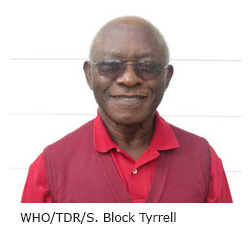 As a young doctor in Cameroon, Thomas Nchinda learned firsthand the limits of medicine in a resource-strapped setting. It was the early 1960s, and the newly independent country was still struggling to meld its East and West – former colonies administered
by the French and British, respectively – into one unified republic.
As a young doctor in Cameroon, Thomas Nchinda learned firsthand the limits of medicine in a resource-strapped setting. It was the early 1960s, and the newly independent country was still struggling to meld its East and West – former colonies administered
by the French and British, respectively – into one unified republic.
Health facilities were few, and for a government medical officer like Nchinda, the challenges were many. “Working in Cameroon at that time was very difficult,” he says, recalling the years he spent rotating through various overburdened district hospitals before his appointment as director of medical services for West Cameroon. It was because of that clinical work, he says, “that I came to see the value of research in trying to figure out how you deliver health care to rural areas.”
Some of these countries had almost zero trained scientists and no national research institutions.
- Thomas Nchinda
In 1972, Nchinda was admitted to the London School of Hygiene and Tropical Medicine, where he studied public health and epidemiology, eventually earning his MD by thesis. And with that, he embarked on a path that would take him, over the next three decades, to nearly every country in Africa, much of it as a member of the TDR staff. Indeed, few have had a longer tenure with TDR than Nchinda, who first learned about the organization from former TDR Director Dr Ade Lucas, when the two met at a conference in Nairobi.
A start with West African research strengthening
Not long after that meeting and while he was still a professor at the University of Yaounde, Nchinda received an invitation from TDR to carry out a short-term mission on its behalf. Over a span of several months, Nchinda was to solicit the participation of several West African countries in TDR’s then-burgeoning research activities. “I visited the principal OCCGE research centres in four countries,” he recalls, referring to the French acronym for the Organization of Coordination and Cooperation in the Fight Against Endemic Diseases. The aim was to encourage young West African nationals to apply for TDR training grants that would pair them with French scientists in the OCCGE, allowing them to build up their expertise. Nchinda didn’t know it at the time, but in carrying out that mission, he too was developing an expertise, and laying the foundations for a career in research capacity strengthening. A year later, he was hired full-time by TDR to manage research capacity strengthening for Africa.
It was 1983, and at the time, says Nchinda, health research in many developing countries was practically non-existent. “Some of them had almost zero trained scientists and no national research institutions.” In view of this staggering deficit, he says, Dr Lucas made research capacity strengthening one of TDR’s topmost priorities, allotting a full quarter of the organization’s total budget to activities in that sphere. “He was very much insistent on this,” says Nchinda, “because you really couldn’t talk about public health disease research without talking about the participation of trained researchers of the countries where these diseases are endemic.”
“I personally went country-by-country to assist health officials in identifying talented young graduates and orienting them toward research,” he recalls. “I organized workshops on research methods and protocol development, and supervised the fieldwork of those protocols selected for TDR funding.”
Mentoring a generation of health research leaders
Though labour-intensive and physically taxing, the work was also highly rewarding, says Nchinda. “I was proud that many of the directors of the institutions we worked with referred to these young researchers as ‘Professor Nchinda’s children.’” As those young researchers “grew up,” he adds, many came to occupy leadership positions in their respective institutions; two, for example – Dr Isabella Quakyi and Dr Fred Binka – were successive directors of the School of Public Health at the University of Ghana; the late Dr Peter Ndumbe was Dean of the School of Medicine at the University of Yaounde in Cameroon; Dr Sodiomon Sirima is Director of the National Center for Research and Training on Malaria in Burkina Faso; and Dr Dorothée A. Kinde-Gazard is currently serving as the Minister of Health of Benin.
I personally went country-by-country to assist health officials in identifying talented young graduates and orienting them toward research.
- Thomas Nchinda
Over his 13 years at TDR, Nchinda saw research capacity strengthening efforts evolve from a broad-based strategy of training large cadres of scientists on a wide array of disciplines to a more focused approach with a greater emphasis on quality. “The research strengthening group adopted a policy of proactively identifying and training young scientists and building research capacities around them,” he says. Grants for institutions were replaced by highly-competitive programme-based scientific grants, while so-called Partnership grants, cofunded by the Rockefeller Foundation, allowed for a developed country institution to partner with an institution in a disease endemic country to carry out a joint research programme.
Today, he says, the fruits of that work can be found across the continent. In Mali and Burkina Faso, Kenya and Tanzania, Nigeria, Ghana and elsewhere, institutions started from scratch with TDR support are now thriving centres of research. “Coming from where we have,” he says, looking back on TDR’s modest beginnings, “I’m just shocked. Big things have come of it.”
For more information, contact:
Makiko Kitamura
TDR Communications Officer
Telephone: +41 22 791 2926
email: kitamuram@who.int

